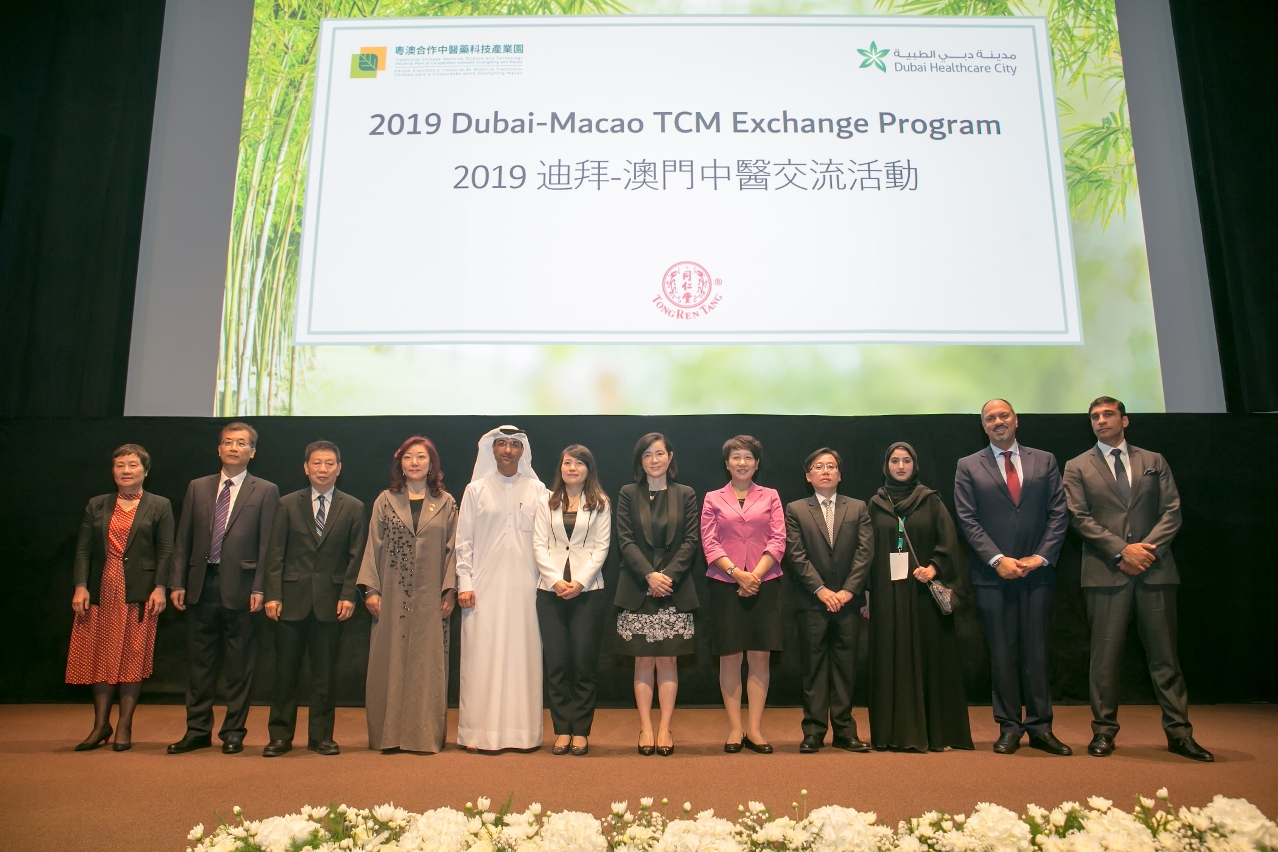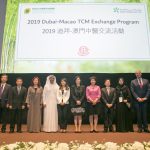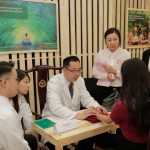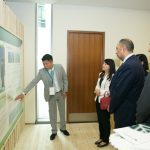 Group photo at the Launch Ceremony of the “2019 Dubai-Macao TCM Exchange Program” held on May 29
Group photo at the Launch Ceremony of the “2019 Dubai-Macao TCM Exchange Program” held on May 29
The 2019 Dubai-Macao TCM Exchange Program, co-hosted by the Traditional Chinese Medicine Science and Technology Industrial Park of Co-operation between Guangdong and Macao (GMTCM Park) and the Dubai Healthcare City (DHCC), was held at the Mohammed Bin Rashid Academic Medical Center of the Dubai Healthcare City on May 19. TCM experts from Macao and mainland China led young TCM practitioners from Macao to exchange and discuss with more than 150 prominent local healthcare professionals in Dubai, focusing on the application and development of TCM in the city. The program also provided TCM health consultations for the locals and promoted the development of TCM in Dubai.
Officiating guests at the opening ceremony included Ms. Lu Hong, Advisor to the Office of the Secretary for Economy and Finance of the Macao SAR Government, and President & CEO of the Guangdong-Macao Traditional Chinese Medicine Technology Industrial Park Development Co., Ltd.; Mr. Imran Sheikh, Chief Investment Officer of the Dubai Healthcare City Authority (DHCA); Mr. Tan Li, Acting Consul-General of the People’s Republic of China in Dubai; Ms. Wang Xiaopin, Director General of the Department of International Cooperation of the State Administration of Traditional Chinese Medicine of the People’s Republic of China; and Mr. Lyu Yubo, Advisor to the Expert Advisory Committee of GMTCM Park and President of the Guangdong Provincial Hospital of Traditional Chinese Medicine.
In their addresses, Ms. Lu Hong, President & CEO of GMTCM Park, and Mr. Imran Sheikh, Chief Investment Officer of the Dubai Healthcare City Authority, remarked that the Dubai-Macao TCM Exchange Program was the first ever specific project carried out since GMTCM Park and DHCA signed a memorandum of cooperation in September last year. Through free consultation and academic exchanges, among other various channels, it was expected to provide a platform for cultural and technological exchange of TCM, promote the application and development of TCM in Dubai, boost industrial growth and technology exchange, and better people’s understanding of complementary and alternative medicine (CAM).
According to Mr. Tan Li, Acting Consul-General of the People’s Republic of China in Dubai and Ms. Wang Xiaopin, Director General of the Department of International Cooperation of the State Administration of Traditional Chinese Medicine of the People’s Republic of China, TCM aroused wide concerns and made remarkable headway in Dubai, where there were dozens of individuals or institutions engaged in TCM-related business activities. The cooperation between Macao and Dubai enjoyed great potential and strength. It was believed that with the concerted endeavors from GMTCM Park and DHCC, TCM would see a better development in the Middle East. Additionally, it would also enable people across the globe to better understand, study and apply TCM.
The DHCC is a professional free trade zone established by the Emirate of Dubai, which aims to build Dubai into a leading regional and international destination that provides premium health and medical care services. The Dubai-Macao TCM Exchange Program is the first cooperation project between GMTCM Park and DHCA after a memorandum of cooperation was inked in September last year. The two sides vowed to jointly strengthen and facilitate cooperation and coordination in the field of health care. The Exchange Program, including academic seminars and health consultations, is expected to enable the locals to fully experience the excellent techniques of TCM, thus deepening their understanding of the TCM culture.
At the opening ceremony of the Exchange Program, four young TCM practitioners from Macao performed the “Ba Duan Jin”, a TCM Qigong (a system of deep breathing exercises) for fitness, showcasing the culture of TCM to the attendees. In the free consultation and exhibition area, TCM experts from the Guangdong Provincial Hospital of Traditional Chinese Medicine, the China UAE Chinese Medical Center (TCM Shanghai Chinese Medical Center) and Tong Ren Tang in Dubai provided services to more than 50 Dubai locals through TCM therapies such as pulse observation, pulse diagnosis, and inquiry, among others.
At the seminar, Ms. Mo Hui, Vice Dean of the Macao University of Science and Technology Hospital, discussed the application of TCM in the diagnosis and treatment of obesity; Ms. Cai Jun, Direcor of Administration of TCM Shanghai Chinese Medical Center shared a brief introduction about using technology and data in clinic operation of Traditional Chinse Medicine; Dr. Yangyang, from the Chinese Medical Center and Physical Health and Healing Center in DHCC, shared insights on herbal medication and TCM practices in Dubai. Furthermore, they conducted heated exchanges and discussions with local traditional medical experts on the development of local traditional medicine, with active interactions on site.
The Exchange Program arranged for Mr. Lu Yubo, Honorary President of the Guangdong Provincial Hospital of Traditional Chinese Medicine, a party of chief physicians from the Hospital, Ms. Mo Hui, Vice Dean of the Macao University of Science and Technology Hospital, together with local TCM experts in Dubai and outstanding young TCM practitioners from Macao, to exhibit the TCM culture, conduct TCM academic exchanges and provide TCM health consultations for traditional medical professionals and the local population in Dubai. At the same time, the Exchange Program was supported by Beijing Tong Ren Tang and DHCC-based CAM facility.




